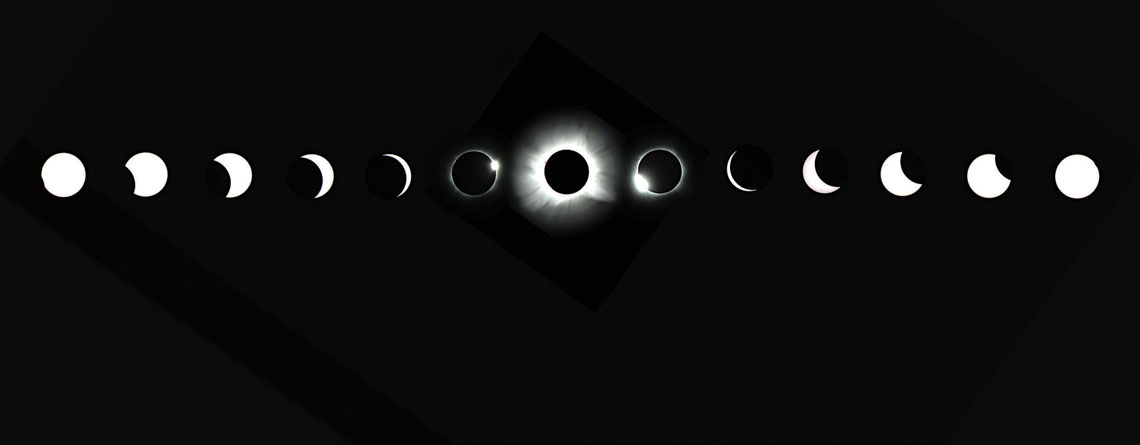 Photo by Rick Fienberg / TravelQuest International / Wilderness Travel
Photo by Rick Fienberg / TravelQuest International / Wilderness Travel The parsha this week is titled Re’eh — “See.” In Deuteronomy 11:26, Moses declares to each individual person God’s command to, “See, this day I set before you blessing and curse.” Our commentators quickly move away from understanding the word re’eh as a visual glance, and move us toward the concept of beholding, perceiving or paying attention.
Of course, what one may “see” as a blessing another person may “see” as a curse. A person who does not like crowds may find attending a county fair to be a punishment, while someone else will consider it a great reward. When a person pays attention and truly sees something, then it is the viewer’s perception that determines if the occasion should be categorized as a blessing or a curse.
Our sages found this to be especially true when it comes to the solar eclipse. It’s hard to see in the dark, and when we hear a sound in the dark, we are quick to jump to negative conclusions, misperceive and become afraid. Perhaps this is why our ancestors were a bit at odds with a solar eclipse, a time when they witnessed darkness when there should be light.
Our Talmud teaches us to understand this rare sight as a curse and not an opportunity for blessing. In our tractate of Sukkot we learn, “When the sun is in eclipse it is a bad omen for the whole world. With what can this be compared? To a flesh-and-blood king who made a banquet for his servants and put a lamp in front of them. When he got angry with them, he said to the servant, ‘Take the lamp away from them, and let them sit in the dark’ ” (Sukkot 29a). Sitting in the dark is rarely a desired event, especially during a banquet.
Since the Jews live by a lunar calendar and other nations by a solar calendar, our rabbis further believed that when an eclipse occurred, these two are in conflict with each other. They even interpreted the color of the face of the sun negatively: If it was red, it meant blood will be spilled in war, and if it was shadowed and dark, then it was like the sackcloth of famine.
But I am troubled by the notion that an awesome occurrence like a total solar eclipse would receive no blessing. As a people, we are commanded to bless 100 times a day: taking note, appreciating, beholding, acknowledging, seeing the wonders of the world we live in and blessing them, giving thanks. We bless everything: from our ability to open our eyes, our mobility, everything we eat, even when we come into contact with a great teacher. And we are to bless the wonders of nature, from rainbows to lightning, earthquakes and even comets. But for an eclipse, our mouths should remain closed?
With modernity, we understand that solar eclipses are an aspect of nature at work, the same as lightning and earthquakes. It is about the moon, whose diameter is about 400 times smaller than the sun’s, being at just the right distance from Earth and in just the right rotational moment, so that it crosses paths between the Earth and sun, blocking the sun from our view. A moment of total eclipse has not been witnessed since 1979 in our country. It is a true wonder that we will pause and re’eh — behold — but from behind protective lenses. How is it possible not to offer blessing?
In our Torah portion this week, each of us is charged to re’eh — to behold blessing and curse, to seek out blessings and curses through our actions and the perception of these occurrences. In the days ahead, I am challenging myself to pause, to pay attention, to look upon the upcoming solar eclipse on Aug. 21 and find a way to approach the radical wonder of the moment with gratitude and blessing while holding the caution of my ancestors in mind. Out of respect for our tradition, I won’t be sharing the blessing usually recited over nature, but I will take guidance from the scientist Roger Price (see page 13), who provides a beautiful three-part structure:
As the eclipse nears: Blessed are You, Source of life that fashions the stars, the sun, the moon …
As we stand in the shadow of darkness not to fear but rather to be thankful: We are thankful to you, God, for the opportunity to witness this moment …
As light re-emerges: Blessed are You who sustains life, renews us fresh, returns light to our day each and every day so we can behold …
I pray that we may each choose to perceive this world as filled with blessings and see within it awe-inspiring moments to witness and give thanks.
Rabbi Sarah Hronsky is senior rabbi at Temple Beth Hillel in Valley Village.























 More news and opinions than at a Shabbat dinner, right in your inbox.
More news and opinions than at a Shabbat dinner, right in your inbox.